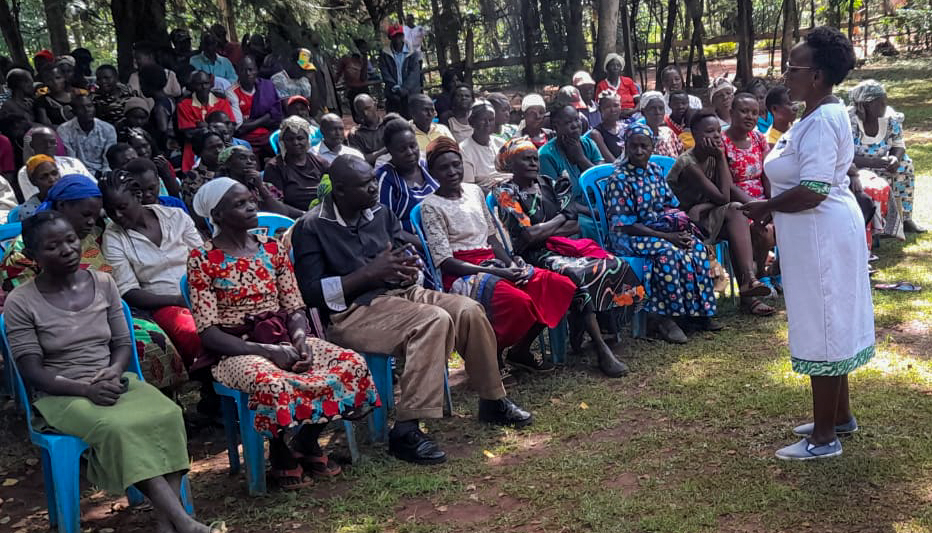Jerusa Aleu (right) during the 2022 campaigns in Milima ward, Bungoma. Photo: Aleu’s campaign.
Jerusa Aleu twice tried to defy the odds and venture into the male-dominated political field but faced stiff resistance, losing in the 2013 and 2017 elections.
She wanted to represent residents of the Milima ward in Tongaren constituency, Bungoma—however, every time she presented herself for election, her bid went up in smoke.
Born and bred in Bungoma, Aleu, a civic educator, witnessed the pain women and children in Milima endured to get by. For years on end, Aleu saw how the healthcare system remained in crisis—dispensaries lay in ruins, and basic services were lacking. She witnessed women and children trekking dozens of kilometers to fetch water—there were no boreholes, and available springs had dried up or continued unprotected.
The high rate of poverty did not make things even better.
“The suffering that I saw took a toll on me,” Aleu said.
Aleu thought the only way of bringing dignity to her community was to represent them in the local assembly. That is where her voice would have been heard through legislation, budgeting, and representation.
Losing not an option
Aleu’s ambition dates back to 2013, three years after the promulgation of the 2010 Constitution, which emphasized the two-third gender rule. She expected her community in Milima to support a woman in the grueling political contest after years of exclusion. She was wrong.
“I was told I am a woman from a minority tribe who had just married in that community and did not deserve any seat,” Aleu recalled how she lost.
In the 2017 polls, Aleu was trounced in the primaries. Nonetheless, the Ford Kenya party nominated her to the county assembly.
“Even then, I did not have as much influence as elected members,” Aleu said.
For instance, she could not issue bursaries to help struggling mothers educate their children, yet she observed elected members dish them to privileged families. She could not influence Milima’s development, too.
“In one case, I proposed a maternity ward to be constructed at Lukhokhwe dispensary in Milima. But some MCAs frustrated the process because they thought it would give me political capital,” she said.
This meant one thing: for Aleu to decide how resources are distributed, she needed to have her constituency. And losing the 2022 contest was not an option.
But Aleu’s previous campaign strategies were problematic, a major reason for her frequent defeats. Her financial management was messy—funds depleted even before the campaigns reached halfway. The messaging was off—she could not connect with voters or articulate her agenda effectively. When heckled in public rallies, Aleu said, she recoiled and resurfaced weeks after losing many grounds.
Campaign strategy sharpened
Rural Empowerment Development Organization (Redo Kenya) is a local NGO in Bungoma that empowers communities. Act! and Uraia Trust, in the 2022 general election, worked with it to offer civic and voter education to female political candidates like Aleu.
Topics covered included political campaign strategies and resource mobilization, gender mainstreaming and responsive budgeting, and pillars of sustainability and survival of candidates.
Ezekiel Odeoh, Redo Kenya program manager, said they reached 34 MCA candidates in these meetings, educating them on an array of issues, including community mobilization. The meetings went on for months and were impactful, he said.
“These interventions helped sharpen the campaign plans for women candidates in Bungoma,” Odeoh said.
“For instance, Aleu hired a finance manager, which she did not have in the previous elections, and this helped organize her funds.”

Aleu said she learned to coin punchy and catchy phrases that helped deliver her manifesto.
“I kept telling voters they must try a woman’s leadership because, since independence, it is only men who led them, yet there was no substantial development,” she said, adding that such messaging reverberated across the ward.
And her eloquence improved, Aleu said.
Redo Kenya made these interventions under Kenya Electoral Conflicts Mitigation and Civic Education Support (ECCES) program. USAID funds it through Act! and Uraia Trust.
After two failed attempts, Aleu finally won the Milima ward seat on August 9, 2022. She defeated 16 opponents—15 of them men—and became the first woman to occupy the office since independence. She got 1,777 votes, and the second-placed candidate, Amunavi Elvis, polled 1,327.
“The forums helped me to organize my campaigns, a key missing link in the past elections,” Aleu said.
During the election, ECCES, which was implemented across 18 counties in Kenya, worked to among others, ensure the participation of women like Aleu in an election. The program encouraged women, youth, and people living with disability to vie for elective posts.
In 2022, Kenyans elected a record number of women to positions of power. For instance, there are 30 female MPs, up from 23 in 2017, and seven governors, up from three in the previous poll.
ALSO, READ AND WATCH























